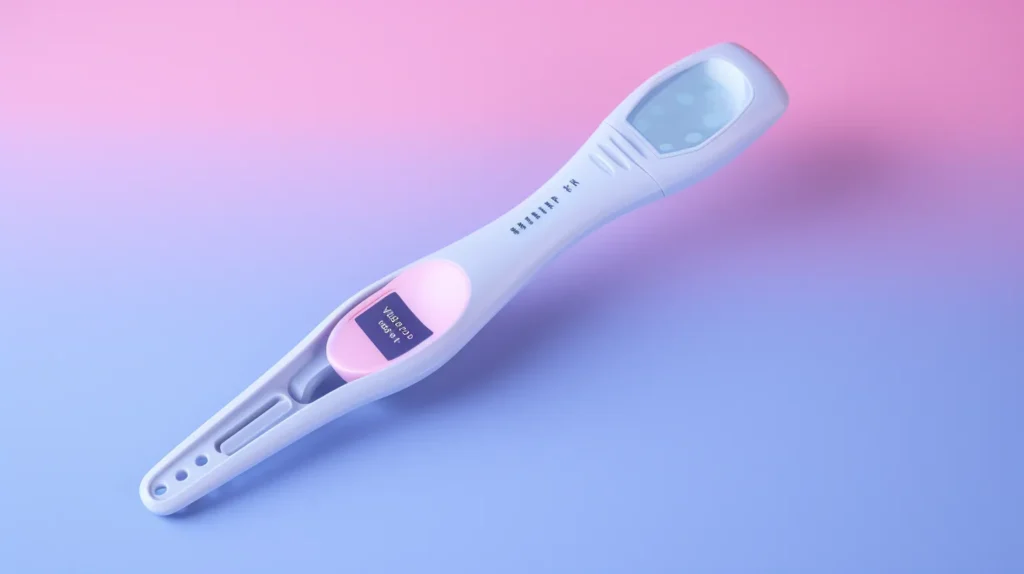Feeling uncertain about whether you’re experiencing early signs of pregnancy? It’s common to feel puzzled; after all, symptoms like tender breasts or fatigue can be misleading. This article will help bring clarity by exploring the first noticeable indicators of pregnancy in detail.

Read on for a comprehensive guide that could potentially answer your pressing questions and soothe those anxieties!
Early Signs of Pregnancy
The early signs of pregnancy include a missed period, breast changes, fatigue, nausea (morning sickness), and spotting and cramping.
Missed Period

A noticeable sign of pregnancy is a missed period, most commonly encountered by women. The woman’s body begins to produce human chorionic gonadotropin (hCG), a hormone that signals the ovaries to stop releasing eggs once conception occurs.
This hormonal action results in no menstrual cycle as there are no eggs for fertilization, leading to a missed period – a clear early indicator of pregnancy. However, it’s worth noting that some women can experience light bleeding or spotting even when pregnant due to other reasons like implantation bleeding described later in this article.
Besides, stress and changes in weight can also cause irregular periods, so missing one doesn’t always confirm pregnancy. For the sake of precision and certainty, taking a home pregnancy test or consulting with your doctor would be highly beneficial if you’ve recently missed your period and suspect potential signs of being pregnant.
Breast Changes
One of the earliest signs of pregnancy is changes in your breasts. As your body prepares for motherhood, hormonal fluctuations can cause your breasts to feel tender and swollen. You may notice that they are more sensitive to touch, and some women even experience tingling or prickling sensations. You might also see the veins on your breasts become more prominent.
Another common change is the darkening of the areolas—the area around the nipples—as well as small bumps known as Montgomery’s tubercles becoming more pronounced. Your breasts may also increase in size due to increased blood flow and milk-producing glands preparing for breastfeeding.
These breast changes typically occur within the first few weeks of pregnancy and can continue throughout the entire duration. It’s important to wear a supportive bra during this time to help alleviate any discomfort you may be experiencing.
Remember, every woman’s experience is unique, so while these breast changes are common early signs of pregnancy, not all women will experience them in the same way or at all.
Fatigue
Fatigue is a common symptom experienced by many women in the early stages of pregnancy. It can be attributed to hormonal changes and increased demands on the body as it works to support the growth and development of the baby.
Feeling tired or exhausted is completely normal during this time, so don’t be too hard on yourself if you find that you need more rest than usual. Be sure to listen to your body and give yourself plenty of opportunities to rest and recharge.
Taking short naps throughout the day, if possible, can also help combat fatigue. Remember that fatigue is just one indicator of pregnancy, so it’s important to consider other symptoms as well when determining whether you may be pregnant or not.
Nausea (Morning Sickness)

Nausea, commonly referred to as morning sickness, is a well-known symptom of early pregnancy. Many women experience feelings of queasiness and even vomiting during their first trimester. This can be attributed to the hormonal changes occurring in the body.
While it is called morning sickness, it can actually happen at any time of the day or night. The intensity and duration of nausea vary from person to person – some may only feel mildly nauseous while others may have more severe symptoms.
It’s important to remember that not all pregnant women experience morning sickness, and for those who do, it usually subsides after the first trimester.
Spotting and Cramping
Spotting and cramping are common early signs of pregnancy that many women experience. Spotting refers to light vaginal bleeding that may occur when the fertilized egg attaches to the uterus lining, also known as implantation bleeding.
This can happen around 6-12 days after conception, and it is usually lighter and shorter than a regular period.
On the other hand, cramping is another symptom that may accompany spotting during early pregnancy. These cramps are often described as mild or similar to menstrual cramps. They occur due to the changes happening in your uterus as it starts preparing for the growth of your baby.
It’s important to note that while spotting and cramping can be normal in early pregnancy, they can also be signs of other health issues. If you experience heavy bleeding, severe pain, or have concerns about your symptoms, it’s always best to consult with a healthcare provider for further evaluation.
Paying attention to your body and being aware of these indicators can give you valuable insight into whether you should consider taking a pregnancy test or seeking medical advice.
Other Recognizable Symptoms of Pregnancy
Increased Urination

One common early sign of pregnancy is increased urination. You may find yourself visiting the washroom more frequently than usual, even in the early stages of conception. This can be attributed to hormonal changes that affect your kidneys and bladder function.
As pregnancy progresses, the growing uterus puts pressure on your bladder, further increasing the need to urinate. So if you suddenly find yourself making frequent pit stops to relieve your bladder, it could be a sign that you are expecting a little bundle of joy.
Changes in Appetite
During early pregnancy, many women experience changes in appetite. Some may have a sudden increase in cravings and find themselves wanting to eat certain foods they normally wouldn’t. On the other hand, some may experience a decrease in appetite or aversion to certain smells or tastes.
These changes are often due to hormonal fluctuations and can vary from woman to woman. It’s important to listen to your body during this time and try to maintain a balanced diet with nutritious foods that will support both you and your growing baby.
Stay hydrated, eat small meals throughout the day if you’re experiencing nausea, and don’t hesitate to reach out for professional advice if you have concerns about your eating habits during pregnancy.
Mood Swings

Pregnancy can be an emotional rollercoaster for many women, thanks to the hormonal changes that come with it. Mood swings are a common early sign of pregnancy and can range from feeling elated one moment to crying uncontrollably the next.
These mood swings occur due to the rapid rise and fall of hormones like estrogen and progesterone in your body. It’s important to remember that experiencing mood swings during pregnancy is completely normal and nothing to worry about.
Heightened Sense of Smell
One of the less talked about but common signs of pregnancy is a heightened sense of smell. During early pregnancy, many women experience an increased sensitivity to odors, which can be quite overwhelming.
Everyday scents that you once found pleasant may suddenly become overpowering and even cause nausea or headaches. This change in olfactory perception is believed to be linked to hormonal changes occurring in the body.
The exact reason behind this heightened sense of smell during pregnancy is not fully understood, but it’s thought to be nature’s way of protecting expectant mothers from potential dangers. It might seem strange or even bothersome at times, especially if certain smells trigger unpleasant reactions, but rest assured – it’s completely normal! So don’t be surprised if you find yourself wrinkling your nose at certain smells or craving particular scents during early pregnancy.
Frequent Headaches
Experiencing frequent headaches is another common symptom that some women may notice in the early stages of pregnancy. These headaches can be caused by hormonal changes, increased blood volume, and changes in blood circulation.
While they are usually not a cause for concern, they can be bothersome and uncomfortable. To help alleviate these headaches, it’s important to stay hydrated, get plenty of rest, practice relaxation techniques such as deep breathing or meditation, and avoid triggers like caffeine or certain foods if they seem to worsen your symptoms.
When to Take a Home Pregnancy Test

To determine if you’re pregnant, knowing the ideal timing for taking a pregnancy test is crucial. Generally, it’s recommended to wait until after you’ve missed your period before testing. This allows enough time for the hormone hCG (human chorionic gonadotropin) to build up in your body and be detected by the test.
Testing too early can result in a false negative result as there may not yet be enough of the hormone to be detected. It’s important to follow the instructions on the pregnancy test kit carefully to get accurate results.
If you suspect you might be pregnant but receive a negative result, it’s advisable to wait a few more days and retest or consult with your healthcare provider for further advice based on your individual circumstances.
Accuracy of Home Pregnancy Tests
Home pregnancy tests are a convenient and affordable way to find out if you’re expecting. These tests work by detecting the presence of human chorionic gonadotropin (hCG), a hormone produced during pregnancy, in your urine.
The accuracy of home pregnancy tests can vary depending on various factors.
In general, home pregnancy tests are quite accurate when used correctly. Most brands claim to be over 99% accurate when taken on or after the day your period is due. However, it’s important to follow the instructions carefully for the most reliable results.
Keep in mind that while home pregnancy tests can detect hCG levels as low as 25 milli-international units per milliliter (mIU/ml), it takes some time for these levels to increase after conception. For this reason, taking a test too early may result in a false negative.
To maximize accuracy, you should wait until you have missed your period before taking a home pregnancy test. If you get a negative result but still suspect that you might be pregnant, waiting another week and retesting can help ensure more reliable results.
If you continue to receive negative results despite experiencing common signs of pregnancy like missed periods and other symptoms mentioned above, it’s advisable to consult with your doctor who can perform blood tests or ultrasounds for confirmation.
When to Consult a Doctor

If you’re experiencing any of the early signs of pregnancy mentioned above, it’s important to consult a doctor for confirmation and guidance. While home pregnancy tests are reliable, a visit to your healthcare provider can provide more accurate results through blood tests or ultrasounds.
Additionally, if you have concerns about your symptoms or want to discuss prenatal care options, it’s best to seek professional advice as soon as possible. Remember that every woman’s experience is unique, so consulting with a healthcare professional ensures personalized guidance tailored to your specific needs.
Taking proactive steps toward prenatal care will help ensure a healthy pregnancy journey for both you and your baby.
key takeaways
1. A missed period, breast changes, and fatigue are common early signs of pregnancy, but they can also be influenced by factors like stress, hormonal fluctuations, and changes in weight.
2. Nausea or morning sickness, often not limited to the morning, and increased urination are typical symptoms due to hormonal changes and the growing uterus.
3. Spotting, cramping, and changes in appetite can occur in early pregnancy, while severe pain or heavy bleeding should be evaluated by a healthcare provider.
4. Mood swings, a heightened sense of smell, and frequent headaches are other signs of early pregnancy, and home pregnancy tests are most accurate about a week after a missed period.
FINAL THOUGHTS
In conclusion, recognizing the first signs of pregnancy is crucial for young couples and pregnant women. From missed periods to fatigue, nausea to mood swings, understanding these early indicators can help expectant mothers navigate their journey with confidence.
Whether it’s implantation bleeding or changes in appetite, paying attention to these symptoms and seeking medical advice when needed ensures a healthy start to this incredible chapter of life.
Related: The Ultimate Pregnancy Guide: Everything You Need To Know For A Happy And Healthy Pregnancy
Also Read: The Essential Roadmap to a Healthy Pregnancy: Nurturing Your Body, Mind, and Relationships
If you found this article helpful, please share it with your friends on WhatsApp, Facebook, or Twitter using the buttons above or below the article.
FAQ – FREQUENTLY ASKED QUESTIONS
What are the early symptoms of pregnancy?
Early symptoms of pregnancy can include a missed period, light spotting, breast changes, fatigue, nausea or morning sickness, frequent urination, and bloating.
How early can symptoms of pregnancy occur?
Some women may notice symptoms as early as one to two weeks after conception. However, the timing can vary from one pregnancy to the next.
What is the most reliable way to know you’re pregnant?
The most reliable way to know you’re pregnant is to take a pregnancy test. These tests measure the level of the pregnancy hormone hCG in your urine.
Can I experience pregnancy symptoms within a week of conception?
Yes, some women may start to feel early pregnancy symptoms within a week of conception. However, these symptoms can be subtle and easily mistaken for premenstrual symptoms.
Can I get a positive pregnancy test result as early as one or two weeks after conception?
Yes, some home pregnancy tests can detect hCG as early as 10 to 14 days after conception, around the time your period is due.
Do pregnancy symptoms continue throughout pregnancy?
Some symptoms, like nausea, may lessen as you move into your second trimester, while others, like abdominal growth and weight gain, will continue throughout pregnancy.
Are there common early pregnancy symptoms to look out for?
Yes, common early pregnancy symptoms include a missed period, nausea, increased urination, fatigue, and breast tenderness. However, symptoms can vary from one pregnancy to another.
Are there other less common early signs of pregnancy that I should look out for?
Yes, in addition to the common signs mentioned earlier, some women may also experience food cravings or aversions, increased sensitivity to smells, mood swings or emotional changes, headaches or backaches. These less common signs can vary greatly from person to person.
Can my symptoms vary from one pregnancy to the next?
Absolutely. Every pregnancy is unique and the symptoms you experience can vary from one pregnancy to the next.
What should I do if I think I might be pregnant?
If you think you might be pregnant, the first step is to take an at-home pregnancy test. If the test is positive, or if you’re unsure, consult a healthcare professional.
Can I have a light period during early pregnancy?
Some women experience light spotting or bleeding early in pregnancy, often around the time their period is due. This is known as implantation bleeding.
Can these early signs be confused with something else?
Yes, some early signs of pregnancy such as breast tenderness and fatigue can also be attributed to hormonal changes during the menstrual cycle or other factors like stress or illness. If you suspect you might be pregnant but are unsure about your symptoms, it is best to take a home pregnancy test or consult with a healthcare professional for confirmation.





